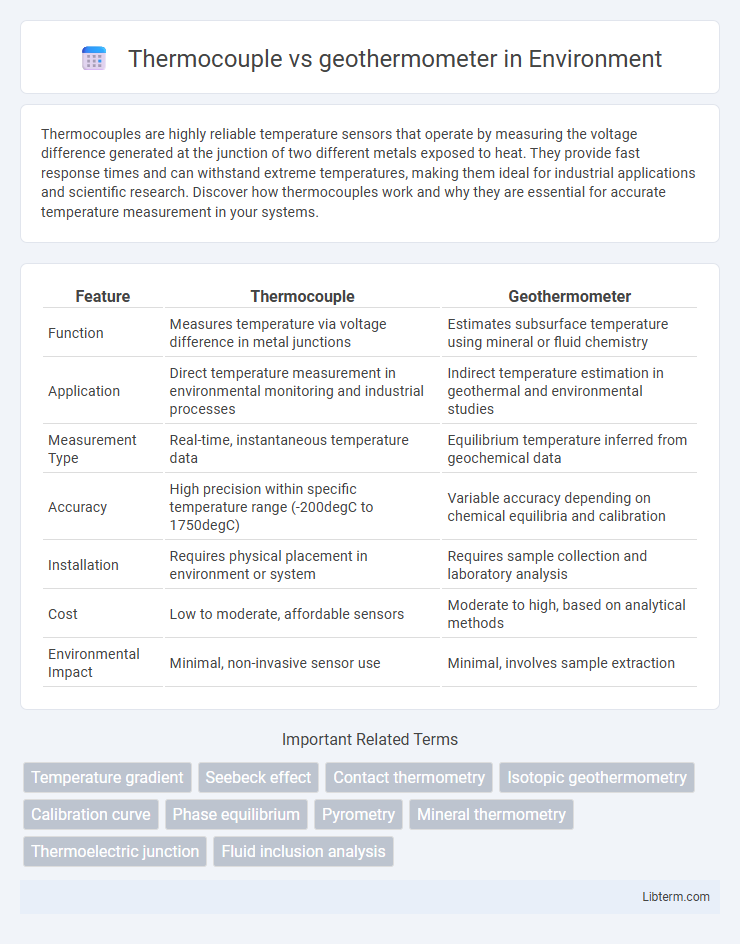Thermocouples are highly reliable temperature sensors that operate by measuring the voltage difference generated at the junction of two different metals exposed to heat. They provide fast response times and can withstand extreme temperatures, making them ideal for industrial applications and scientific research. Discover how thermocouples work and why they are essential for accurate temperature measurement in your systems.
Table of Comparison
| Feature | Thermocouple | Geothermometer |
|---|---|---|
| Function | Measures temperature via voltage difference in metal junctions | Estimates subsurface temperature using mineral or fluid chemistry |
| Application | Direct temperature measurement in environmental monitoring and industrial processes | Indirect temperature estimation in geothermal and environmental studies |
| Measurement Type | Real-time, instantaneous temperature data | Equilibrium temperature inferred from geochemical data |
| Accuracy | High precision within specific temperature range (-200degC to 1750degC) | Variable accuracy depending on chemical equilibria and calibration |
| Installation | Requires physical placement in environment or system | Requires sample collection and laboratory analysis |
| Cost | Low to moderate, affordable sensors | Moderate to high, based on analytical methods |
| Environmental Impact | Minimal, non-invasive sensor use | Minimal, involves sample extraction |
Introduction to Temperature Measurement Technologies
Thermocouples and geothermometers serve distinct roles in temperature measurement technologies, with thermocouples providing direct electrical voltage readings in response to temperature variations through the Seebeck effect, widely used across industrial applications for their rapid response and broad temperature range. Geothermometers estimate subsurface temperatures indirectly through chemical or isotopic analysis of minerals and fluids, crucial for geothermal reservoir assessment and research. Understanding these technologies' principles and applications enables accurate temperature monitoring critical for processes spanning from manufacturing to earth sciences.
What is a Thermocouple?
A thermocouple is a temperature measurement device consisting of two dissimilar metal wires joined at one end, generating a voltage correlated to temperature differences between the junction and the reference point. Commonly used in industrial applications, thermocouples provide rapid and accurate temperature readings across a wide range of temperatures, from -200degC to +1750degC. Unlike geothermometers, which rely on mineral equilibria in geothermal fluids to estimate subsurface temperatures, thermocouples measure temperature directly through electrical signals.
Overview of Geothermometer Principles
Geothermometers estimate subsurface temperatures by analyzing mineral chemistry or isotopic ratios in geothermal fluids, reflecting equilibrium conditions between minerals and fluids. Thermocouples measure temperature directly through voltage generated at junctions of dissimilar metals, providing real-time readings without chemical analysis. Geothermometers rely on empirical calibrations and thermodynamic models to infer temperatures from geochemical signatures, whereas thermocouples provide instantaneous electrical signals corresponding precisely to temperature changes.
Applications of Thermocouples in Industry
Thermocouples are widely used in industry for precise temperature measurement in manufacturing processes, including metal forging, chemical production, and food processing, due to their durability and rapid response time. Unlike geothermometers, which estimate subsurface temperatures by analyzing geothermal fluids or rock minerals, thermocouples provide real-time data essential for maintaining process control and safety. Industries like aerospace, automotive, and power generation rely heavily on thermocouples to monitor engine temperatures, turbine operations, and HVAC systems for optimal performance.
Geothermometers in Geological Exploration
Geothermometers are essential tools in geological exploration for estimating subsurface temperatures by analyzing the chemical composition of minerals and fluids, providing critical data on geothermal gradients and heat flow. Unlike thermocouples that measure temperature directly through voltage differences in metal junctions, geothermometers interpret temperature conditions from equilibrium states, offering insights into historical thermal regimes and fluid-rock interactions. These geothermometric techniques enhance the accuracy and depth of geothermal resource assessments, aiding in the discovery and sustainable management of geothermal energy reservoirs.
Accuracy and Sensitivity Comparison
Thermocouples offer rapid response times and moderate accuracy, with typical measurement errors around +-1 to +-2degC, suitable for high-temperature environments but less sensitive to small temperature changes. Geothermometers, based on chemical or mineral equilibrium data, provide higher accuracy in geothermal reservoir temperature estimation, often within +-5degC, but their sensitivity is influenced by geological conditions and sampling precision. The choice between thermocouples and geothermometers depends on the specific application requirements for real-time monitoring versus long-term temperature assessment.
Installation and Maintenance Considerations
Thermocouples offer simple installation with minimal wiring requirements and are well-suited for high-temperature environments, but they require periodic calibration to maintain accuracy. Geothermometers involve more complex installation, often requiring calibration from soil or fluid samples, and may need seasonal maintenance to account for environmental changes. While thermocouples are sensitive to electrical noise affecting longevity, geothermometers provide more stable long-term measurements with less frequent maintenance intervals.
Cost-effectiveness and Durability
Thermocouples offer a cost-effective solution for temperature measurement with wide temperature ranges and rapid response times, making them ideal for industrial applications requiring durability under harsh conditions. Geothermometers, while more expensive due to specialized mineral or fluid analysis, provide greater accuracy for geothermal reservoir temperature estimation but may require frequent calibration and maintenance. The long-term durability of thermocouples in physically demanding environments often outweighs the operational costs of geothermometers in cost-sensitive scenarios.
Advantages and Limitations of Each Method
Thermocouples offer rapid temperature measurement with high accuracy and durability in extreme environments but require calibration and electrical connections that can limit their use in remote geothermal settings. Geothermometers, based on mineral equilibrium or fluid chemistry, provide indirect temperature estimates useful for long-term geothermal reservoir assessment but can be affected by fluid mixing and chemical alteration, reducing precision. Both methods complement each other; thermocouples deliver real-time data while geothermometers help understand subsurface thermal history and reservoir conditions.
Choosing Between Thermocouple and Geothermometer
Choosing between a thermocouple and a geothermometer depends on the specific temperature measurement environment and required accuracy. Thermocouples are ideal for dynamic, high-temperature applications due to their fast response time and wide temperature range, while geothermometers are specialized tools designed for estimating subsurface temperatures based on mineral equilibria in geological samples. Selecting the appropriate device requires evaluating factors such as measurement precision, environmental conditions, and the nature of the temperature data needed for industrial or geoscientific purposes.
Thermocouple Infographic

 libterm.com
libterm.com